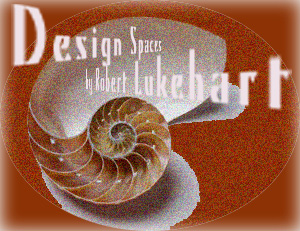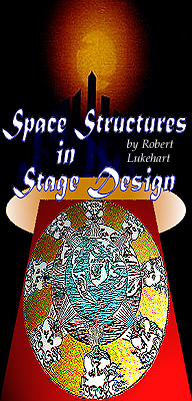| Philosophy for Live Events | |||||||||||||||||
| The Subjective Imperative: Toward a Greater Space in Neo-Classical Symbolist Theatre. |
As a matter of real-world theatre, few organizations place much value on performance standards when fiscal issues take center stage. The business of raising funds for performance often neglects the real reason theatre attracts audiences and receives payment for performance. I focus on the subjective imperative of performance as it relates directly to the audience. This is true in Children's Theatre as well as in the modern Tragi-Comedy. In these papers, I am concerned with Tragi-Comedy, but other forms can benefit from these perspectives. I have sought to distinguish stage performance from other media by its fundamental immediacy of actor and audience and by its achievements toward building this greater ensemble. Though I have employed multimedia projections, transformational structures and other trappings of spectacle to live events, I am fundamentally concerned with the actors' ensemble toward a residential and ontological truth that delivers a prolific stage presence for immediacy of intellect and emotion. From this perspective, the economic success of regional theatre is firmly placed in the hands of the actor and the supporting structures beneath his or her performance through ensemble, design and, lastly, spectacle. What is Ontological Presence? The fullest examples of Shakespeare, Chekhov or Beckett build resonance in a theatre space by enveloping audience and actor into a shared environment of intellectual, historical and emotional stimuli where a cathartic and fully subjective reaction may occur in the audience. Review my thesis: The Subjective Imperative of Voice in Samuel Beckett below. | ||||||||||||||||

|

| ||||||||||||||||

| |||||||||||||||||
|
Contemporary treatments to Shakespeare and the Classics are important for the vitalization of theatre and not necessarily for the vitalization of the Classics. Some Theatre of the 70s and 80s failed precisely by providing its audience with what was expected. By maintaining overt stereotypes of Classic Theatre, Periodism, melodrama and cinematic naturalism, the theatre achieves detachment from subjective imperatives and fails to deliver the richness of surprise, timeliness and ontological vitality that distinguishes all successful live performance.
Postmodernism may alienate audiences further by disengaging the actor from the task of the subjective imperative that builds true performance. Some in theatre have sought to demystify the actor/audience relationship by associating the ensemble with a social revolt that holds ceremony and emotion suspect. My goals are to achieve intellectual and ontological or emotional truth through the generously trained acting ensemble. The traditions of humanism must evolve, as our contemporary issues dictate, but they must evolve in the direction of emotional realism where the power of Classic tragedy can be achieved in a modern context. | New Life for the Classics | ||||||||||||||||

| |||||||||||||||||
| The Old made New: Because all performance is a timeless ambition. |
Great performance continues to expose the windows of human desire and ultimately builds the great attitudes and insights of culture. The American biases toward important theatre remain awash in stereotypes. This may be a factor in the relative scarcity of important and relevant drama on the American scene. Yet the most successful performances confront these stereotypes dramatically and expose the inherent falseness to the proposition that contemporary, serious drama does not confront mainstream American issues.
Yet theatres continue to lose sponsorships and attendance by failing to confront the forces of perception that undermine their vitality and distinctiveness. For all art, corporate, theatrical or political will fail if true subjective imperatives are not mastered and fulfilled generously. Fundamental to this subjectivity is the primal subsistence of individual desires that may not be approached by film or television, but only by live performance. You can soon access my plays, essays and production notes on Modernism in Contemporary American Theatre. Contact me for information and links to Shakespeare, Samuel Beckett and the post-war Tragi-Comedy. My Treatment for Waiting for Godot. The Subjective Imperative: Samuel Beckett
My Art for Classical Symbolist Theatre | ||||||||||||||||

| |||||||||||||||||
| Favorite links | ||||||||||||||||

| |||||||||||||||||
 �Robert Lukehart 1998. This page has been visited
�Robert Lukehart 1998. This page has been visited
|